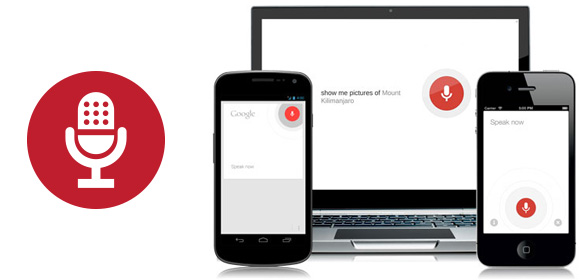How To Begin Preparing Your Content For The Voice Search Era
Sahail Ashraf posted on 19 October 2017
Anyone who uses search on a computer or a mobile device knows how quickly (and often how intuitively) the process gets you where you want to go. The Internet, and search engines, were created to help people learn more, and do more.
And above all, search engines have allowed us to find information at great speed. Whether you feel it stops us from being inquisitive human beings is immaterial. In the end, it makes everyone a little more capable. Search has brought information to billions of people. So what if search changed?
It is about to change, as it happens. There has been a quiet revolution in recent months, so quiet you may well have missed it. Voice search has slowly become a reality, with Siri and Cortana (mainly mobile phone-based) and Google Home (in our residence) showing that there is huge potential to help humans become more efficient and effective.

The only problem is, this kind of search does not require us to type things into an interface. The only requirement is a voice. And this has some implications for brands and the digital agencies that serve them.
How it’s working
Voice search is probably something that we all first encountered when Apple ran those TV ads that had joggers and other athletic people talking to their phone. Siri would answer back politely and generally make the jogger’s world a better place. Then the reality of using Siri set in, and frustration was the norm.
Times have changed, and this has meant that Siri, as an example of just one voice assistant, is now able to work more intuitively and has better voice recognition. Cortana (Microsoft) is also much more powerful now, and able to help people out much quicker than it used to. The software is getting better, and there have been predictions that voice search will be the norm for more than 50% of all search by the year 2020.
Whether that is coming true or not, you can’t fail to notice that people are starting to use Alexa (Amazon) and Google Home to try and manage their home lives better. The number of skills for Alexa, for example, has mushroomed in the last few months, creating a search portal that is looking more ‘intelligent’ every day.
All of this would be absolutely fine if search via text was exactly the same as it is on a voice activated device. But it isn’t, and this is the issue.
Why text search and voice search are different things
Well, it’s actually quite a subtle difference. When we search with text, via our fingers on a phone or computer, we use pretty similar phrases. For example, we may type ‘best places to eat’ into our phones and then wait as (invariably) Google finds us a list of pages.
With voice search you often have to use the name of the search device (‘Cortana’, for example) and you also find yourself having a more conversational tone. So it’s:
‘Hey Cortana, tell me the best places to eat Chinese in Kentish Town’
While on text search it’s:
‘Best Chinese’ or ‘Best Chinese Kentish Town’.
Now, the intent may be the same, but if voice search becomes the behemoth everyone thinks it is going to be, different phrasing means a whole new way of using keywords. It also means that the content a searcher finds will have to present as a direct outcome of the search. And with the unpredictability of people’s turn of phrase and moods, this could mean that brands have to recalibrate their content.
In other words, search may well change completely within the next few years, and brands will have to adjust accordingly.
What this all means
Well, let’s put it this way. There is every chance that people will find it harder to locate and visit your website, for starters. The content of a website will have to tune in to how people use voice search.
For example, if someone is asking Siri for people who offer digital marketing, they will ask ‘who can help with digital marketing near me’, or ‘where is the nearest digital marketing expert?’. This means that unless you have relevant words and phrases on your landing page, voice search won’t show your page as part of results.
People tend to have a conversation with voice assistants. This conversational tone will need to be replicated in the content your client has on its digital assets. You will have to find out how people ask voice assistants for information, and how this drives search. It is complicated, and for some brands it may even affect rankings and traffic.

Imagine if someone is looking for ‘property management’. Instead of typing in ‘property management’ and expecting Google to throw up local results, they will probably ask ‘tell me where is the nearest property management company?’. We’re hazarding a guess here, but this could mean that your client’s content won’t come up first. And that’s including social media.
What you can do
Keep it conversational
It’s going to be like this: ‘Which is the best coffee shop near me?’
That’s tough to manage, perhaps. But if you create blog post content, for example, and social media posts, around the common questions your customers ask, you’re halfway there. Or revamp your FAQ content so it references these questions.
Make a client’s website mobile-friendly
They’re going to find your website via voice on mobile mostly, so make the mobile website a quick-loading thing, with conversational content, so it mirrors and responds to conversational tones and questions.
Coffee shop London
That’s a typical text search on a phone. On voice, you’re looking at a longer search, possibly something like ‘Siri, where is there a small coffee shop with WiFi?’ And web content for a brand that offers this has to use this language. This makes the brand a ‘small, cozy coffee shop with the best WiFi’ in its blog posts and web copy, as well as its social media work.
The future
For brands, this may well entail a completely new way of looking at search, and a new way of presenting content, including content on social media. The best way to explain this is to look, bizarrely perhaps, at Netflix.
Netflix is a smorgasbord of entertainment. But users browse. They look at the latest offerings, and then they drill down for ‘comedy’, ‘horror’ or ‘Tom Cruise movies’. They are looking for stuff they want to consume right now, and they are very specific. It is all on-demand, and the relationship between consumer and provider is very conversational and personal.
And when they get to TV shows and movies, they expect to get it quickly. Think about voice search. This is on-demand, specific, and personal.
When they say ‘Hey Siri…’ users are expecting a bespoke experience, tied in perfectly to the words they say. So search becomes ‘Hey Siri, what is the best digital marketing agency that does social media near me right now?’ The brand’s content needs to cover all of that.
It’s weird, but we are strongly convinced that agencies and brands need to change their content so it is more conversational, not to mention so that it is tightly focused on coming up in voice search. Already, users are finding that voice search gives them different results to text search.
Put simply, when a customer asks ‘what is the best price for two sets of wireless headphones’, it may well mean that you need to be ready to answer with your content. No one really knows how voice search will affect brands, but with voice being responsible for more search, it’s looking like it’s time to act. This may well mean making content (and the search that finds that content) that accommodates full sentences in search, not single words as in text searches.
How’s your social media work looking? Are clients happy? We bet they appreciate data, right? Try Locowise free for seven days. Its data and metrics reporting, but not as you know it. Get ready to step into data like you’ve never seen before.




